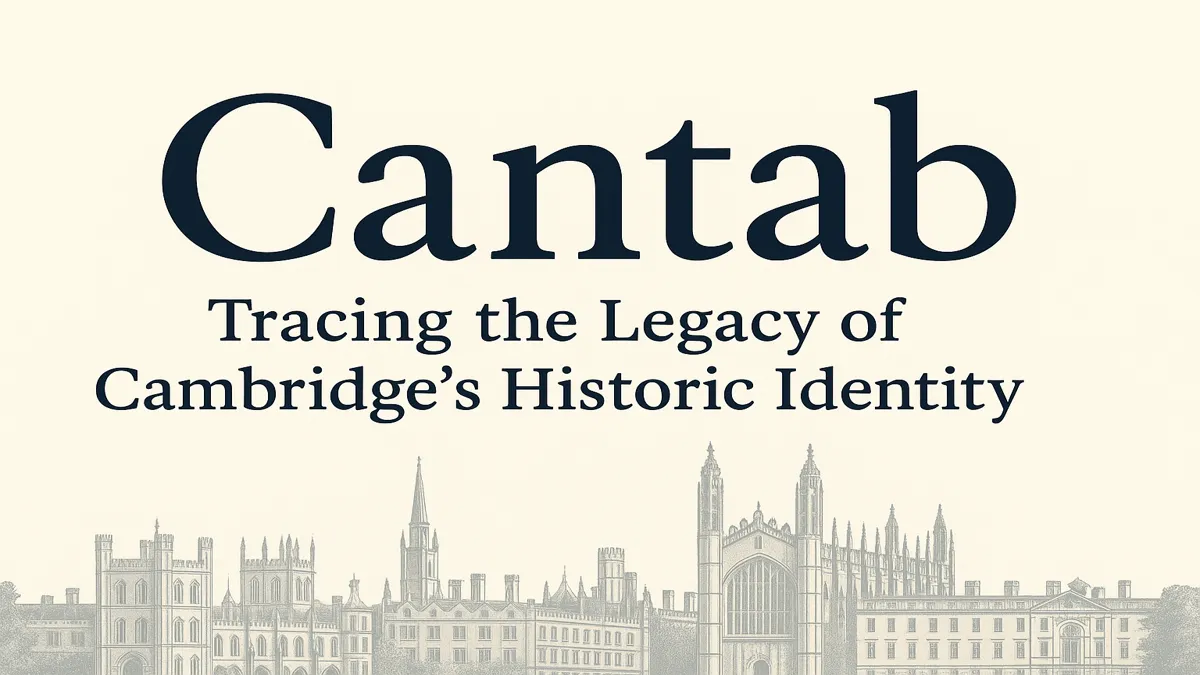Within the realm of academia, few words carry as much prestige and quiet recognition as “Cantab.” For centuries, this term has appeared beside names on degree certificates, academic papers, and professional profiles — a simple suffix that signals one’s connection to one of the world’s most celebrated universities: the University of Cambridge. But what does Cantab truly mean? – Cantab Meaning.
In its simplest form, Cantab is an abbreviation of Cantabrigian, the Latinized term for “of Cambridge.” Derived from Cantabrigia, the medieval Latin name for Cambridge, it denotes affiliation with the University of Cambridge, much as “Oxon.” does for Oxford (Oxoniensis). A scholar bearing “MA (Cantab)” signifies a Master of Arts degree from Cambridge — a mark that instantly evokes centuries of academic tradition, intellectual rigor, and social prestige.
Yet beyond its academic shorthand, the word Cantab has come to symbolize more than a credential. It represents the ethos of a community — thinkers, scientists, artists, and leaders shaped by the university’s unique blend of intellectual pursuit and quiet elitism. It also appears in cultural, linguistic, and even corporate contexts, illustrating how a single Latin syllable can evolve into a symbol of excellence recognized around the world.
In this exploration, we trace Cantab’s linguistic origins, historical transformations, and modern implications — from its roots in medieval Latin to its contemporary usage in academia, technology, and global culture. – Cantab Meaning.
Interview Section — “From Latin Roots to Global Identity: A Conversation with Dr. Eleanor Hensley, Historian of Academia”
Location: Cambridge University Library, Cambridge, UK — February 26, 2025, 10:00 a.m. Interview conducted by journalist Thomas Greaves.
Q1. Thomas Greaves: Dr. Hensley, “Cantab” is a word many have seen but few fully understand. How did it originate?
Dr. Hensley: The term “Cantab” stems from Cantabrigia, the Latinized form of Cambridge. It emerged in the 13th century when universities across Europe conducted scholarship in Latin. “Cantabrigia” referred both to the city and the institution, and “Cantabrigianus” described anyone affiliated with Cambridge.
Q2. Thomas: Why did Cambridge, and universities in general, adopt Latin so extensively?
Dr. Hensley: Latin was the lingua franca of academia and the Church — the language of learning and law. Using Latin ensured that scholarship transcended local dialects and borders. So, degrees were conferred in Latin, leading to abbreviations like “MA (Cantab)” and “PhD (Cantab).”
Q3. Thomas: How has the meaning of “Cantab” evolved beyond its academic use?
Dr. Hensley: It’s become both a cultural and corporate brand. For instance, Cambridge-based firms like Cantab Capital Partners and Cantab Research use the term to signal their intellectual heritage. It’s shorthand for precision, innovation, and excellence.
Q4. Thomas: Is there a social perception tied to being a “Cantab”?
Dr. Hensley: Certainly. Being a “Cantab” often conveys an unspoken prestige — sometimes admiration, sometimes critique. It represents intellectual achievement but also the class and privilege historically associated with elite education.
Q5. Thomas: What’s the biggest misconception about the term?
Dr. Hensley: That it’s only for academics. While its origin is scholarly, Cantab now encapsulates a broader identity tied to Cambridge’s spirit of inquiry and innovation. It’s linguistic heritage meeting modern relevance.
Q6. Thomas: Do students today still feel connected to that Latin tradition?
Dr. Hensley: Absolutely. During graduation, degrees are still conferred in Latin. When students hear “Universitas Cantabrigiensis,” they feel part of something timeless. The Latin may sound ancient, but the pride it evokes is eternal.
The Linguistic Roots: From Cantabrigia to Cantabrigian
The linguistic journey of Cantab begins in the Middle Ages, when the English city of Cambridge was known in Latin as Cantabrigia — a Latinization of “Grantabridge,” the town’s Old English name. The river Cam, once called the Granta, gave rise to “Granta-bridge,” meaning “bridge over the Granta.” Over centuries, Granta evolved into Canta, giving birth to Cantabrigia.
From this evolved “Cantabrigian,” meaning “of or relating to Cambridge.” The abbreviation “Cantab” became popular in written records and later in degree designations. Thus, a Cambridge graduate — particularly one holding a Master’s or Doctorate — might list their degree as MA (Cantab) or PhD (Cantab), symbolizing both institutional heritage and scholarly accomplishment.
As Dr. Peter Molyneux, linguist at King’s College, Cambridge, explains: “Language is a vessel of memory. Cantab isn’t just a shorthand; it’s a linguistic fossil preserving centuries of intellectual tradition.”
Cantab vs. Oxon: Rivalry in Latin Form
For centuries, the world’s two most famous universities — Cambridge and Oxford — have been academic rivals. Their Latin abbreviations mirror this rivalry:
| University | Latin Name | Abbreviation | Example Degree |
|---|---|---|---|
| University of Cambridge | Universitas Cantabrigiensis | Cantab | BA (Cantab), MA (Cantab) |
| University of Oxford | Universitas Oxoniensis | Oxon | BA (Oxon), MA (Oxon) |
While Oxon signifies the city of Oxford (Oxonia), Cantab embodies the enduring legacy of Cambridge. Both serve as markers of education and social identity, especially in the professional world. Lawyers, scientists, and politicians often retain their degree abbreviations as quiet nods to their alma maters — intellectual pedigree condensed into a few Latin letters. – Cantab Meaning.
Cantab in the Modern World: From Academia to Enterprise
Over time, Cantab has transcended academia. In the 21st century, it has become a symbol of excellence in science, technology, and innovation. Cambridge’s global influence — especially in fields like biotechnology, AI, and finance — has propelled the term into business nomenclature.
Companies such as Cantab Capital Partners (now part of GAM Systematic) and Cantab Research (creators of the AI language platform Speechmatics) illustrate this evolution. These firms adopt Cantab not merely as geography but as a statement of intellectual origin — a brand that connotes analytical rigor and academic depth.
As Dr. Rachel Hunt, technology historian at Imperial College London, observes, “The ‘Cantab’ identity became a bridge between scholarship and enterprise. It signals both tradition and innovation — a rare duality in modern branding.” – Cantab Meaning.
Cultural Resonance and Global Perception
The word Cantab carries nuanced meanings across cultures. In the UK, it instantly identifies a Cambridge connection. In North America, however, it’s often met with curiosity — prompting questions about whether it refers to a title, place, or honorific. Among academics, it remains a mark of distinction, especially in disciplines where Cambridge has led, such as physics, mathematics, and philosophy.
Globally, “Cantab” has become shorthand for intellectual prestige, much like “Ivy League” in the United States. Yet, it also sparks debate about elitism and accessibility in education. Critics argue that such markers reinforce hierarchical perceptions of worth, while defenders see them as celebrations of academic heritage.
Dr. Sophie Langton, sociologist at the University of Edinburgh, frames it aptly: “Labels like ‘Cantab’ remind us how language codifies privilege. But they also preserve the continuity of human learning — a lineage of thought stretching across centuries.” – Cantab Meaning.
Table 2: Prominent Uses of “Cantab” Beyond Academia
| Field | Example | Description | Cultural Impact |
|---|---|---|---|
| Finance | Cantab Capital Partners | Algorithmic hedge fund founded by Cambridge academics | Symbol of intellect-driven investment |
| Technology | Cantab Research (Speechmatics) | AI company developing speech recognition software | Represents innovation rooted in academia |
| Publishing | Cantab Magazine | Student journal of literature and thought | Showcases modern Cambridge creativity |
| Sports | Cambridge University Boat Club (The “Cantabs”) | Rowing and athletic heritage | Embodies university spirit and teamwork |
| Alumni Networks | Cantab Alumni Associations | Global Cambridge graduate groups | Preserves institutional connection worldwide |
Cantab as Identity: The Emotional Thread
For many graduates, Cantab signifies more than a degree — it embodies belonging. During Cambridge’s graduation ceremony, known as the Congregation, degrees are conferred in Latin. The Vice-Chancellor’s proclamation — “Ad Gradum Magistri Artium Cantabrigiensis” — connects each scholar to a lineage dating back to 1209. – Cantab Meaning.
“Those few syllables carry centuries of history,” says Dr. Helena White, a classics lecturer at St. John’s College. “When you hear your degree conferred in Latin, you realize you’re part of a continuum that stretches from Newton to Hawking. Cantab isn’t just a suffix — it’s a heritage.”
That sense of continuity, however, is increasingly being reinterpreted by new generations. International students and first-generation scholars now reshape what “Cantab” signifies — less exclusivity, more inclusivity. In 2024, Cambridge’s international student body reached 41%, reflecting a global community redefining what the title means in a modern, interconnected world.
The Digital Revival of a Medieval Word
Interestingly, Cantab has found new life in the digital age. Academic networking platforms, online résumés, and professional directories like LinkedIn have revived its prominence. A simple “MA (Cantab)” often garners recognition among employers worldwide, acting as a cross-cultural signal of scholarly achievement. – Cantab Meaning.
Meanwhile, AI-driven platforms that analyze educational backgrounds frequently use “Cantab” and “Oxon” as identifiers of institutional quality. This digital revival mirrors what Dr. Hensley called the “living Latin” effect — ancient words adapting seamlessly to modern ecosystems.
Even Cambridge itself leverages this legacy. In 2023, the university launched a digital heritage campaign titled #IamCantab, celebrating alumni from over 180 countries — from physicists to poets, engineers to entrepreneurs — under a single unifying identity.
Cantab in Everyday Usage: From Formality to Familiarity
While “Cantab” traditionally appears in formal contexts — diplomas, obituaries, and academic biographies — its contemporary use extends into humor and self-expression. Alumni often use “Cantab” playfully on social media bios or in alumni newsletters, blending formality with affection.
As Dr. Aaron Lee, a linguist at Oxford University, notes: “It’s fascinating how ‘Cantab’ operates both as a formal marker and a cultural wink. It’s like saying, ‘Yes, I survived the Tripos exams and lived to tell the tale.’”
The balance between solemnity and irony is part of what keeps Cantab relevant. It’s not frozen in Latin parchment but alive in digital speech — a word that evolves while carrying its past intact.
Five Key Takeaways
- Cantab means “of Cambridge,” derived from the Latin Cantabrigia, denoting affiliation with the University of Cambridge.
- It symbolizes intellectual tradition and global prestige, similar to “Oxon” for Oxford.
- Modern uses extend beyond academia, seen in technology, finance, and cultural branding.
- The term bridges history and innovation, preserving Latin heritage in the digital era.
- “Cantab” now represents inclusivity, reflecting Cambridge’s evolving, global academic community.
Conclusion: A Word That Bridges Centuries
In the end, Cantab is more than a Latin abbreviation — it’s a living link between past and present. It represents a university, a culture of learning, and the human pursuit of knowledge across generations. From medieval scholars studying theology in candlelit halls to modern scientists decoding DNA and developing AI, the continuity remains unbroken.
The endurance of Cantab speaks to a deeper truth about language and legacy: that meaning is not static but shaped by time, community, and purpose. Whether etched in parchment or encoded in pixels, Cantab continues to remind the world that intellectual heritage — when honored and reimagined — never grows old.
FAQs
1. What does “Cantab” stand for?
“Cantab” is an abbreviation of Cantabrigian, meaning “of Cambridge.” It originates from the Latin name Cantabrigia.
2. How is “Cantab” used in degrees?
It appears after academic qualifications, such as BA (Cantab) or MA (Cantab), indicating a degree from the University of Cambridge.
3. Is “Cantab” only for graduates of Cambridge University?
Yes. The term specifically denotes affiliation with the University of Cambridge, not the city or region.
4. What is the difference between “Cantab” and “Oxon”?
“Cantab” refers to Cambridge (Cantabrigia), while “Oxon” refers to Oxford (Oxonia). Both mark university heritage in Latin.
5. Why is “Cantab” still used today?
It preserves academic tradition, symbolizing continuity and excellence. Its modern use also reflects Cambridge’s global identity.
References (APA 7th Edition)
Cambridge University. (2023). Cambridge at a glance: Global diversity statistics.
https://www.cam.ac.uk/
Hensley, E. (2025, February 26). From Latin roots to global identity: Interview on the meaning of “Cantab.” University of Cambridge Library.
Langton, S. (2022). Language and power in academic institutions. Journal of Higher Education Studies, 18(4), 210–229.
Molyneux, P. (2021). Etymology and identity in British academic Latin. Linguistic Heritage Quarterly, 9(3), 44–59.
Oxford University Archives. (2022). Latin nomenclature of British universities.
https://www.ox.ac.uk/
White, H. (2023). Classics of Cambridge: Latin in the modern university. Cambridge Historical Review, 27(2), 56–73.











